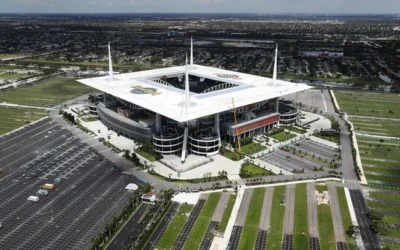July offered several varying insights from CFOs of major companies on their respective earnings calls. Here are eight that stood out, from the CFOs of Alphabet, Tesla, AT&T, Johnson & Johnson, 3M, Harley-Davidson, Imax and BlackRock.
1. Alphabet
Market cap: $2.10 trillion
Ruth Porat, who will take on the role of president and chief investment officer at Alphabet after being CFO for nearly a decade, participated in what she called her “last” earnings call at the company. In addition to thanking her colleagues and reflecting on her time with the company, she also had a warning for those who may be doubting the legitimacy of new technology.
“The people on this call know that if technological advancement is not the focus of every business and government, they will be left behind. Underpinning this is the need for sound and responsible investment.”
2. Tesla
Market cap: $727.28 billion
Tesla is still the leader in the electric vehicle market despite its second-quarter net income falling 45% compared to last year’s figure. Even with the drop, partially due to competing EVs, Tesla is confident in its ability to continue delivering vehicles at a high rate, said Vaibhav Taneja, who is approaching the one-year mark as CFO.
“If you’re waiting on the sidelines, come out and get your car. We had a record quarter on regulatory credits revenue as well. On net, our auto margins remained flat sequentially. It is important to note that the demand for regulatory credits is dependent on other OEMs’ plans for the kinds of vehicles they are manufacturing and selling as well as changes in regulations.
“We pride ourselves on being the company with the most American-made cars and are continuing our journey to further localize our supply chain, not just in the U.S., but in Europe and China as well for the respective factories.”
3. AT&T
Market cap: $135.52 billion
AT&T’s CFO Pascal Desroches highlighted during the call and on LinkedIn how the company’s finances are preparing for an expansion in connectivity demand while also making efforts to pay off debt.
“Our approach to capital allocation remains consistent and deliberate. We’re successfully balancing efficient growth with long-term investments in delivering converged network services to more customers, paying down debt, and returning value to shareholders. We remain focused on deleveraging and have reduced our net debt by about $2 billion year to date.”
Desroches said regarding the company’s preparedness for third-party partnerships in service offerings: “When you look at our performance, the overall company, as well as mobility, we are running ahead halfway through the year of the full-year guidance that we gave. And so whatever the environment is, I feel like we are incredibly well-positioned for it.”
4. Johnson & Johnson
Market cap: $382.13 billion
Joseph Wolk, CFO of Johnson & Johnson, responded to an analyst’s question on rebate extraction to help cover other areas of loss in the company. After Jennifer Taubert, the company’s executive vice president and worldwide chairman of innovative medicine responded to the analyst’s question, Wolk added his take on industry efforts to raise discounts on drugs.
“Discounts and rebates six years ago as compared to list price were only about 25% of that list price. Today, that number — and this is not just the J&J number, but an industry number — gravitates toward 60%. So what we want to make sure that happens is this great innovation gets to patients and makes a difference in their lives and [gets] them — they have access through the discounting that we already provide.”
5. 3M
Market cap: $68.43 billion
3M’s CFO Monish Patolawala emphasized in his latest and final call the importance of effective cash flow management, disciplined spending, strategic capital allocation, and achieving strong financial performance through operational efficiency. Patolawala is set to take over as CFO of Archer Daniels Midland on Aug. 1.
“We generated $4.6 billion of free cash flow in the quarter, up nearly $400 million year over year. This is the result of sustained growth in adjusted EBITDA, improved conversion of EBITDA into free cash flow, and lower capital investment.”
6. Harley-Davidson
Market cap: $5.13 billion
While answering a question from an analyst, Jonathan Root, CFO of Harley-Davidson, provided a glimpse into the company’s strategy for reducing costs.
“As we think about some of the actions that we’ve taken as a company, we certainly are making sure that we’re kind of moving through the P&L, looking at places that we can make sure that we are intelligent in taking costs out of the business in a way that doesn’t do anything to harm the long-term nature of the business and really allows us to maximize current results. We certainly have kind of instituted a little bit of belt-tightening for 2024.”
Root added: “We have a number of investments that we’ve made in the manufacturing and cost of sales side to ensure that we are working collaboratively with suppliers to reduce and remove costs from motorcycles in a way that is transparent to consumers.”
7. Imax
Market cap: $1.07 billion
Natasha Fernandes, CFO of Imax, spoke about her company’s success in diversifying revenue mixes. As the box office continues to struggle with its post-pandemic bounceback, Fernandes expects the rebound soon but is pleased with the opportunities coming from outside their traditional products.
“It is clear our business is at a positive inflection point with global box office, system sales, and installations accelerating ahead of a strong Hollywood and local language slate. We are also very encouraged by the growing diversity of our business and revenue mix, highlighted by contributions from new and emerging revenue streams not tethered to studio products. Events and experiences like The Blue Angels, Queen Rock Montreal and The Beach Boys further diversify our business while driving capacity utilization across our global network.”
8. BlackRock
Market cap: $129.36 billion
BlackRock CFO Martin Small highlighted the large push for technology spending. Like many CFOs, Small emphasized how his role has influenced his thoughts on allocating resources toward technology.
“Technology, it’s just the main engine for investment performance, right? It’s the main engine to drive operating leverage. It’s what great firms, I think, are using to have great client experiences that fuel growth.”
He noted the consistent growth rate in how clients are investing in more technology. “I can tell you as a CFO, if I could invest in tech spend, I would. Generally in the marketplace, there’s just an acceleration in tech spend across the board. But I think importantly, clients are trying to retire this kind of ‘spaghetti patchwork’ of legacy systems they have.”





